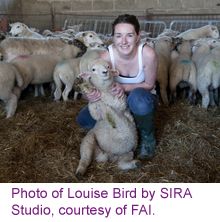The long and short of it
The Trust offers several EMS Vacation Research Scholarships of £500 to £1,500 to support veterinary undergraduates carrying out research projects during their compulsory EMS.
 Louise Bird, a final-year student at the University of Edinburgh, was one of last year’s recipients.
Louise Bird, a final-year student at the University of Edinburgh, was one of last year’s recipients.
So, what was your project?
I looked at the impact of short-scrotum castration on the weight gain of lambs at the Farm Animal Initiative in Oxford, to compare it with the weight gain of lambs castrated with the standard method, and also those of lambs which were left entire.
Sounds painful. Why research that in particular?
There are over 36 million sheep in the UK and a standard method of castration is used on most farms, although New Zealand farmers prefer using a short-scrotum method. I was also in contact with a farm that is interested in more welfare-friendly ways of husbandry and it had assisted with a previous study that showed that lambs’ pain responses to be lesser with the short-scrotum rather than the standard method.
Why would a farmer want to change method?
Short-scrotum castration takes the same amount of time, can be performed before seven days of age with no anaesthetic and uses the same equipment as the standard method, so if I could prove that weight gain is improved by this means of castration, and that this castration is effective, then farmers are more likely to choose this method – it’s something that works in the real world.
And what did you find out?
My results showed that the short-scrotum method does make lambs infertile – and that weight gain in lambs castrated this way was improved compared with that of entire lambs. There were no lambs castrated by standard methods on the farm, so I used research paper data on lamb weight when castrated by standard methods, which also came out favourably. As a preliminary study it would need further research to prove that short-scrotum castration produces superior weight gain to the traditional method – but the results show this research to be worth doing.
What’s next?
Hopefully, to graduate and then work in a farm animal practice! Longer term, I’m interested in modifying or finding new, more welfare-friendly farming practices. I recognise that economic benefits to the farmer of using new husbandry methods need to be proven before they will be widely accepted, and carrying out this project has helped me better understand this balance.
Could you have done this without the Trust’s support?
I doubt it – I needed to keep going back to the farm to weigh the lambs and sometimes stay over so the grant paid for my travel and accommodation and also for equipment I needed.